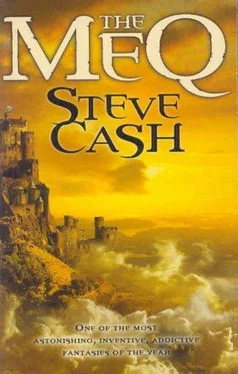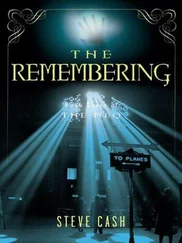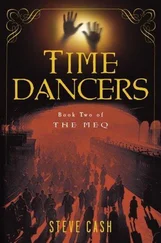Steve Cash - The Meq
Здесь есть возможность читать онлайн «Steve Cash - The Meq» весь текст электронной книги совершенно бесплатно (целиком полную версию без сокращений). В некоторых случаях можно слушать аудио, скачать через торрент в формате fb2 и присутствует краткое содержание. Год выпуска: 2005, Издательство: Del Rey, Жанр: Фэнтези, Детективная фантастика, ya, на английском языке. Описание произведения, (предисловие) а так же отзывы посетителей доступны на портале библиотеки ЛибКат.
- Название:The Meq
- Автор:
- Издательство:Del Rey
- Жанр:
- Год:2005
- ISBN:нет данных
- Рейтинг книги:4 / 5. Голосов: 1
-
Избранное:Добавить в избранное
- Отзывы:
-
Ваша оценка:
- 80
- 1
- 2
- 3
- 4
- 5
The Meq: краткое содержание, описание и аннотация
Предлагаем к чтению аннотацию, описание, краткое содержание или предисловие (зависит от того, что написал сам автор книги «The Meq»). Если вы не нашли необходимую информацию о книге — напишите в комментариях, мы постараемся отыскать её.
The Meq — читать онлайн бесплатно полную книгу (весь текст) целиком
Ниже представлен текст книги, разбитый по страницам. Система сохранения места последней прочитанной страницы, позволяет с удобством читать онлайн бесплатно книгу «The Meq», без необходимости каждый раз заново искать на чём Вы остановились. Поставьте закладку, и сможете в любой момент перейти на страницу, на которой закончили чтение.
Интервал:
Закладка:
After that night, it took us just two weeks to sort out what to do. There was hardly any debate and no indecision. We even took a vote and had to stop, laughing, because we never got to the second choice. It was amazingly simple. Out of the chaos of that night, our path became clear — Lullyon Coit was forgotten and our “direction” was away from Caitlin’s Ruby, west to America and St. Louis. Sailor used the word “family” and that’s what we would be. Carolina’s home would be the only place to do it.
There was no joy in our leaving. Daphne had become much more than a gracious host. Leaving her and knowing we might not see her again was painful, but not awkward. She was also attached to Caine like a fierce mother lion and promised “not to die” before he was old enough to remember her.
Willie decided to go with us. He had no choice, really. He was addicted to Star. Nova was a mix of emotions, as was Star, and both wanted to stay longer, or at least promise to come back often, and that’s what we did. Solomon’s “Diamond” could wait, but regular visits were promised and assured. If the Fleur-du-Mal was still in business, then he would find us, no matter where we were.
Tillman never turned up, as expected, and we left on a morning that was gusting with wind and rain, similar to the afternoon when we’d arrived. Daphne stayed inside until we pulled away, but I saw her sneak a last look through a window from the kitchen. I still have a dream that always begins with our departure from Caitlin’s Ruby.
One unusual event occurred as we were leaving the country that has become more humorous with time. I don’t think anyone has ever known the truth of what happened except me.
We had to stop briefly at the foreign desk of Lloyd’s Bank in London, in order for Willie to make some transfers for Daphne and himself before we left. Willie went in alone, but Star and I were lingering in the lobby, watching the bank traffic and trying to keep Caine from grabbing my nose. I looked past Caine’s little finger and through the glass and realized I knew the young man inside, the agent from Lloyd’s Bank who was doing business with Willie. It was Thomas Eliot from St. Louis, the kid in love with Carolina. He was older and taller and wearing glasses, but there was no doubt.
I couldn’t resist what came to mind. It was just too good and Ray would have loved it. I knocked on the glass until I got their attention. I told Star to play along, no matter what I did and no matter what Willie said, to stay silent and just nod if she had to acknowledge anything. She agreed. When we entered the office, Thomas Eliot was telling a joke and had his back to us. He had reached the punch line when he turned and saw something only he and I could see, an impossible time warp to him, but just family relations to me. He saw a young woman, Carolina to him, almost exactly the same age as the last time he’d seen her — impossible — and she was with the same dark-haired boy she’d been with that day. It was too much for him. Instead of finishing the joke, he laughed to himself. It was a laugh to keep from falling apart, a tiny laugh of last defense, and Willie said, “Dammit, Tom, if you were plannin’ on tellin’ me a joke, then end it with a bang, not a damn whimper.”
I never told Carolina about it, but I smiled the rest of the way. Mowsel was waiting on the docks to see us off. His hair curled out from under his cap and around the collar of his old jacket. Willie left him with a thousand instructions and only stopped when Trumoi-Meq smiled and displayed the proud gap of his missing tooth. It seemed to be a signal Willie had long understood as the end of negotiations. I had only spoken to Trumoi-Meq twice between New Year’s Eve and our departure — once to say we had much to say to each other and once to promise someday to do it.
On the crossing, I asked Geaxi what she might do. I knew she would eventually become restless at Carolina’s. She said she had heard of something new in aviation called “barnstorming,” and thought she might look into it. I said, “But you’re still only a twelve-year-old girl.” She said, “Exactly.”
Carolina told Daphne before we left to keep the black coupe until Caine was old enough to come back and drive it. Carolina and Opari talked constantly about everything and Opari and Star never stopped asking Carolina about America, even baseball, and they all became mothers to Caine. Willie took care of Nicholas and Eder. They were secure belowdecks and beneath the waves.
The voyage west to America was cold and wet and we kept mostly to ourselves, as always. Just before we docked in New York, I took a walk on the deck, alone, and stared out at New York as it came into view. I was leaning on the railing and behind me a voice said, “Excuse me, son, would you mind looking after my things while I step inside a moment?” I turned and there was a thin old black man in a perfectly fitted and pressed black suit. “Not at all, sir,” I said. “I’d be glad to.” He turned and walked quietly through the door behind him, never looking back. His “things” consisted of two books and a train ticket to Ithaca, New York, stuck in one of the books as a marker. The books were Leaves of Grass and a well-worn Bible. I turned the Bible open to the page that was marked with the ticket. It was Matthew and read, “Except ye become as little children, ye shall not enter the kingdom of heaven.” I thought about Sailor and wondered if that was true or could be true or was even relevant.
Just then, the old man came back through the door and smiled. “You religious, son?” he asked.
“Yes and no,” I said.
He laughed, and looked familiar when he did it. “Where’s home, kid?”
I hesitated for a heartbeat; I hadn’t thought of it that way since. since I’d asked an old Jewish man the same question, a stranger who was taking me there anyway. I could still hear his voice in my head, so I answered the old man the way Solomon would have answered. I said, “St. Louis, kid. St. Louis.”
I’ll remember you, while you remember me;
I’ll remember everything you wanted to be.
So, please be a brave lad,
My heart sails with thee.
And I’ll remember you, while you remember me.
ABOUT THE AUTHOR
STEVE CASH lives in Springfield, Missouri, where he was born and raised and educated. After an attempt at gaining a college degree, he lived on the west coast, in Berkeley, California, and elsewhere. He returned to Springfield to become an original member of the band the Ozark Mountain Daredevils. He is the co-author of the seventies pop hits “Jackie Blue” and “If You Wanna Get to Heaven.” For the last thirty-three years he has played harmonica, written songs, performed with the band, helped in the raising of his children, and read books. The Meq is his first novel.
This is a work of fiction. Names, characters, places, and incidents are the products of the author’s imagination or are used fictitiously. Any resemblance to actual events, locales, or persons, living or dead, is entirely coincidental.
Интервал:
Закладка:
Похожие книги на «The Meq»
Представляем Вашему вниманию похожие книги на «The Meq» списком для выбора. Мы отобрали схожую по названию и смыслу литературу в надежде предоставить читателям больше вариантов отыскать новые, интересные, ещё непрочитанные произведения.
Обсуждение, отзывы о книге «The Meq» и просто собственные мнения читателей. Оставьте ваши комментарии, напишите, что Вы думаете о произведении, его смысле или главных героях. Укажите что конкретно понравилось, а что нет, и почему Вы так считаете.












